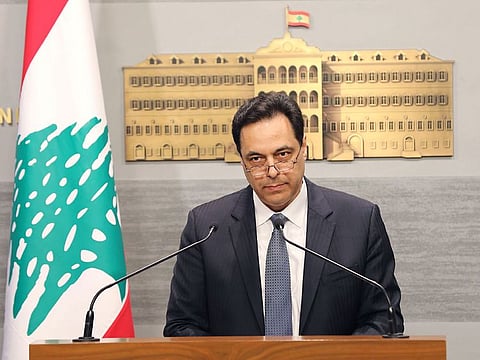Lebanon freezes $1.2 billion bond payment, seeks restructuring of $90b debt
The decision opens the door to bond overhaul of country with heavey debt overhang

Also In This Package
Beirut: Lebanon will suspend a $1.2 billion Eurobond payment due on Monday and seek talks with creditors to restructure its entire $90 billion debt pile, the first step in a broader plan to stabilize an economy in crisis.
“Our foreign currency reserves have reached a critical and dangerous level, forcing the Lebanese Republic to suspend payment on its March Eurobond,” Prime Minister Hassan Diab said in televised address. “How can a country’s economy grow on borrowing and how can we be truly free while we’re drowning in debt?”
The premier, who only formed his government two months ago amid months of nationwide protests, said the country’s ratio of debt to gross domestic product had reached 170% and it was neither right nor possible to keep borrowing to “finance corruption” that had become entrenched in the public sector. Diab said his government would seek to restructure its debt through negotiations with bondholders.
Debt overhaul
The announcement opens the way for a long-anticipated bond overhaul in a country with one of the world’s highest debt loads, dwindling foreign-currency reserves and double-digit inflation. Negotiations will be complicated by political divides that have held up previous efforts to turn around the economy and high foreign ownership of bonds maturing this year. Lebanese banks and the central bank hold most of the rest of the government’s Eurobonds.
It also follows weeks of political wrangling on how to place the country’s finances back on a sustainable path, after foreign remittances - the main source of hard-currency revenue - slowed to a trickle as confidence fell and the banks imposed restrictions on the transfer and withdrawal of dollars.
Protests erupted in several parts of the country including Beirut over the severe economic slowdown and sharp depreciation of the local currency on the parallel market. People held up an over-sized Lebanese flag Zouk Mosbeh, north of the capital, that read: “Immigration, Hunger, Poverty, Money Seized, Diseases, Oppression, Corrupt.”
Local lenders, who hold almost $14 billion of the notes, had lobbied against a disorderly default that would force hefty losses on creditors, warning that it could do irreparable harm to the reputation of the banking sector and to its capital.
Swap option
The central bank, which itself owns about $5.5 billion of the debt, has proposed swapping the March bond for longer-dated instruments.
Bond investors are more skeptical about the prospects for an easy fix. The notes have mostly traded below 30 cents on the dollar, suggesting the market expects the country to wipe roughly 70% off their value.
The valuations have still lured some investors, including Ashmore Group Plc, which has amassed large positions in the March bond, as well as $1.3 billion of notes maturing in April and June. Investors including distressed-debt specialist Greylock Capital Management and Mangart Capital Advisors have formed a group for potential negotiations with the government.
Lebanon has hired Lazard Ltd. and Cleary Gottlieb Steen & Hamilton as advisers.
Even with a decision to restructure debt, an agreement with bondholders may be complicated by political bickering and rampant corruption. The remaining debts are denominated in Lebanese pounds and are largely held domestically.
Ripple Effects
Diab said that Lebanon would come up with a comprehensive plan to stabilize the economy, including an overhaul of the loss-making electricity company, while creating a social safety net in a country with rising poverty levels. He said the banking sector had made large profits as the country’s finances had deteriorated and would need to be restructured though the government would seek to protect smaller depositors. The comments raise the prospect that the largest depositors could face losses.
“I heard a lot of concerns about depositors. We are still evaluating our options and they are many, but let me be clear; we will protect deposits in the banking sector especially small depositors who represent more than 90% of total bank accounts,” Diab said.
Hezbollah, an Iran-backed militant and political group, has rejected the possibility of seeking a financial aid program from the International Monetary Fund, fearing it could hurt the poor and be used by the U.S. as a political lever. That could undermine one anchor of economic reform creditors look for when forgiving debt.
Bank limits on access to dollars have led to a parallel currency market that’s pricing a devaluation of more than 40% for the Lebanese pound, which has been pegged to the dollar at the same rate since 1997.
For a government that’s been in place since January, an economic overhaul may prove difficult to push through.
“Deep sectarian divisions in the political system and high regional security risks will continue to hamper policy making,” S&P Global Ratings said in a report last month. “A potential debt restructuring will have ripple effects across the domestic financial system.”
Sign up for the Daily Briefing
Get the latest news and updates straight to your inbox









